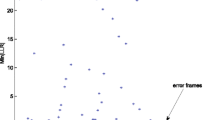Abstract
Belief propagation (BP) decoder is a low decoding latency algorithm for polar codes. However, the block error rate (BLER) performance of the BP decoder is inferior to the cyclic redundancy check (CRC) aided successive cancellation list (CA-SCL) decoder with medium list size for polar codes. Thus, in this paper, we introduce a bit-flip method into the belief propagation list (BPL) decoder and propose a BPL bit-flip (BPLF) decoder to improve the BLER performance of BP-based decoder for polar codes. The proposed decoder is based on a CRC-aided belief propagation list (CA-BPL) decoder, and the error-prone bits are obtained from the decoded result to construct flip bits set (FBS). The bits in FBS are flipped to obtain the correct decoding result. Moreover, the simulation results show that the BLER of the proposed BPLF decoder is significantly superior to that of the CA-BPL despite having the same list size, e.g., there is 0.75 dB gain at BLER = 10−4 with list size 64. Furthermore, the decoding complexity and latency of the proposed BPLF decoder are only slightly higher than those of CA-BPL decoder with the same list size in medium to high signal-to-noise ratio (SNR) region.
Similar content being viewed by others
References
Arikan E. Channel polarization: a method for constructing capacity-achieving codes for symmetric binary-input memoryless channels. IEEE Trans Inform Theor, 2009, 55: 3051–3073
Niu K, Chen K, Lin J R, et al. Polar codes: primary concepts and practical decoding algorithms. IEEE Commun Mag, 2014, 52: 192–203
Alamdar-Yazdi A, Kschischang F R. A simplified successive-cancellation decoder for polar codes. IEEE Commun Lett, 2011, 15: 1378–1380
Tal I, Vardy A. List decoding of polar codes. IEEE Trans Inform Theor, 2015, 61: 2213–2226
Asiadis O, Balatsoukas-Stimming A, Burg A. A low-complexity improved successive cancellation decoder for polar codes. In: Proceedings of the 48th Asilomar Conference on Signals, Systems and Computers, Pacific Grove, 2014. 2116–2120
Zhang Z, Qin K, Zhang L, et al. Progressive bit-fipping decoding of polar codes over layered critical sets. In: Proceedings of IEEE Global Communications Conference, Singapore, 2017. 1–6
Yu Y R, Pan Z W, Liu N, et al. Successive cancellation list bit-flip decoder for polar codes. In: Proceedings of the 10th International Conference on Wireless Communications and Signal Processing, Hangzhou, 2018. 1–6
Arkan E. A performance comparison of polar codes and reed-muller codes. IEEE Commun Lett, 2008, 12: 447–449
Arikan E. Polar codes: a pipelined implementation. In: Proceedings of the 4th International Symposium Broadband Communication, Melaka, 2010. 11–14
Yuan B, Parhi K K. Early stopping criteria for energy-efficient low-latency belief-propagation polar code decoders. IEEE Trans Signal Process, 2014, 62: 6496–6506
Simsek C, Turk K. Simplified early stopping criterion for belief-propagation polar code decoders. IEEE Commun Lett, 2016, 20: 1515–1518
Zhang Q, Liu A J, Tong X H. Early stopping criterion for belief propagation polar decoder based on frozen bits. Electron Lett, 2017, 53: 1576–1578
Yuan B, Parhi K K. Algorithm and architecture for hybrid decoding of polar codes. In: Proceedings of the 48th Asilomar Conference on Signals, Systems and Computers, Pacific Grove, 2014. 2050–2053
Sun S H, Cho S G, Zhang Z Y. Post-processing methods for improving coding gain in belief propagation decoding of polar codes. In: Proceedings of IEEE Global Communications Conference, Singapore, 2017. 1–6
Elkelesh A, Ebada M, Cammerer S, et al. Belief propagation decoding of polar codes on permuted factor graphs. In: Proceedings of IEEE Wireless Communications and Networking Conference, Barcelona, 2018. 1–6
Doan N, Hashemi S A, Mondelli M, et al. On the decoding of polar codes on permuted factor graphs. In: Proceedings of IEEE IEEE Global Communications Conference, Abu Dhabi, 2018. 1–6
Elkelesh A, Ebada M, Cammerer S, et al. Belief propagation list decoding of polar codes. IEEE Commun Lett, 2018, 22: 1536–1539
Trifonov P. Efficient design and decoding of polar codes. IEEE Trans Commun, 2012, 60: 3221–3227
Zhang H Z, Li R, Wang J, et al. Parity-check polar coding for 5G and beyond. In: Proceedings of International Conference on Communications, Kansas City, 2018, 1–6
Yu Y R, Pan Z W, Liu N, et al. Belief propagation bit-flip decoder for polar codes. IEEE Access, 2019, 7: 10937–10946
Acknowledgements
This work was partially supported by National Key Research and Development Project (Grant No. 2018-YFB1802402) and Huawei Tech. Co., Ltd.
Author information
Authors and Affiliations
Corresponding author
Rights and permissions
About this article
Cite this article
Yang, Y., Hu, Y., Pan, Z. et al. Belief propagation list bit-flip decoder for polar codes. Sci. China Inf. Sci. 64, 192306 (2021). https://doi.org/10.1007/s11432-019-2801-6
Received:
Accepted:
Published:
DOI: https://doi.org/10.1007/s11432-019-2801-6




